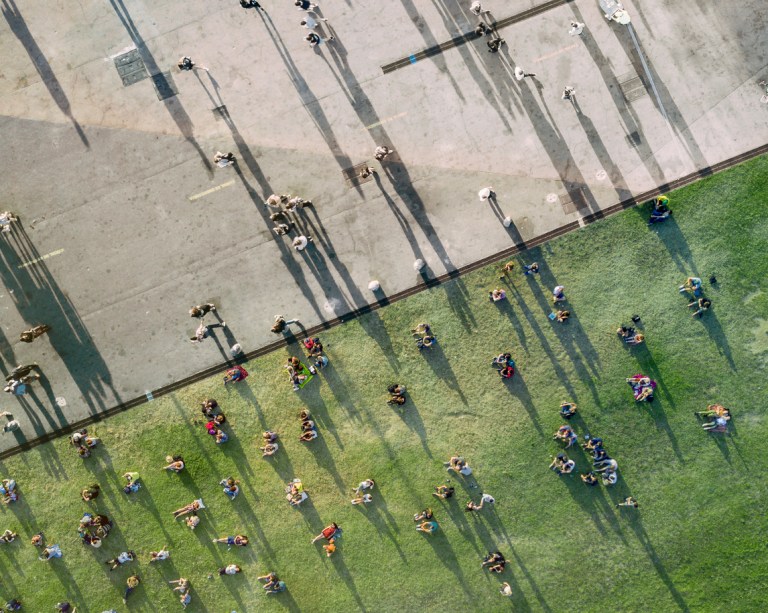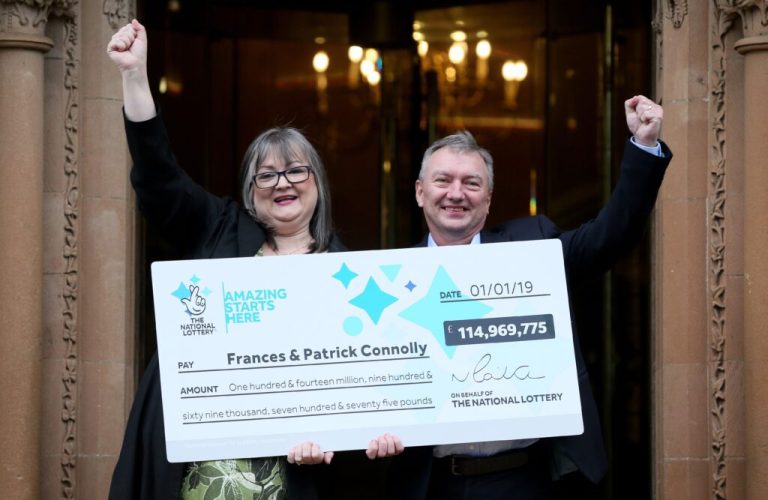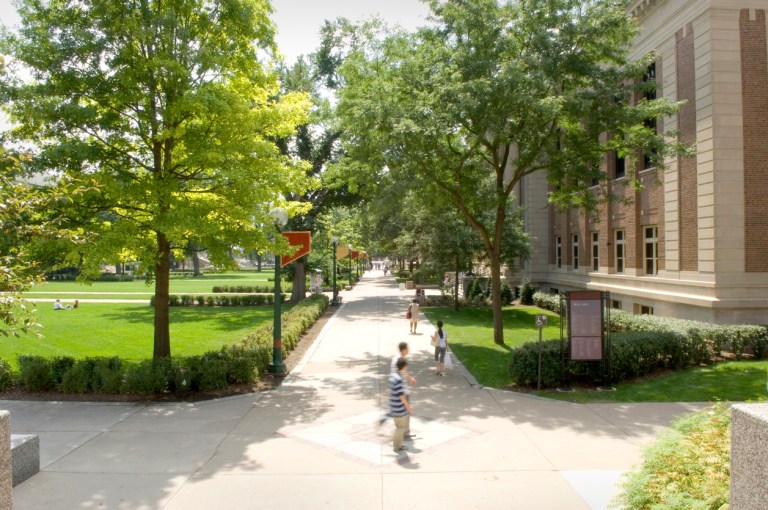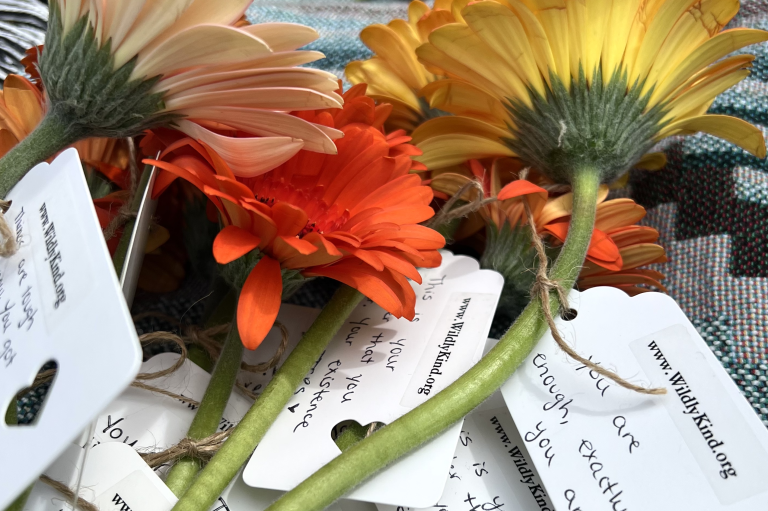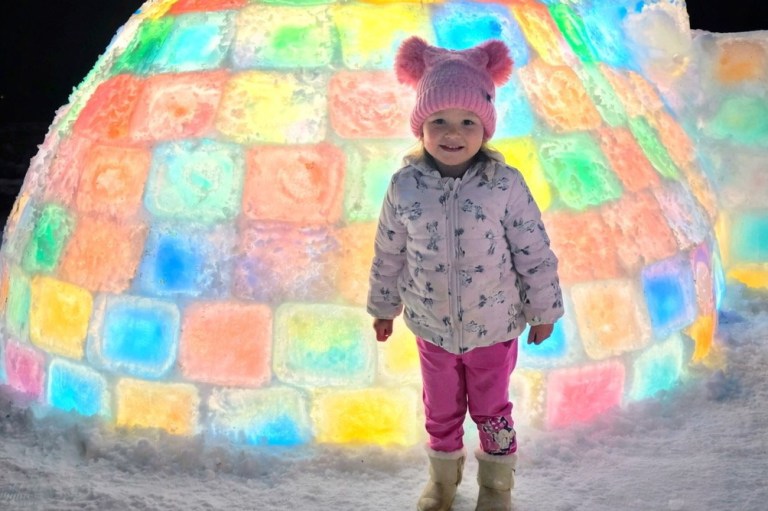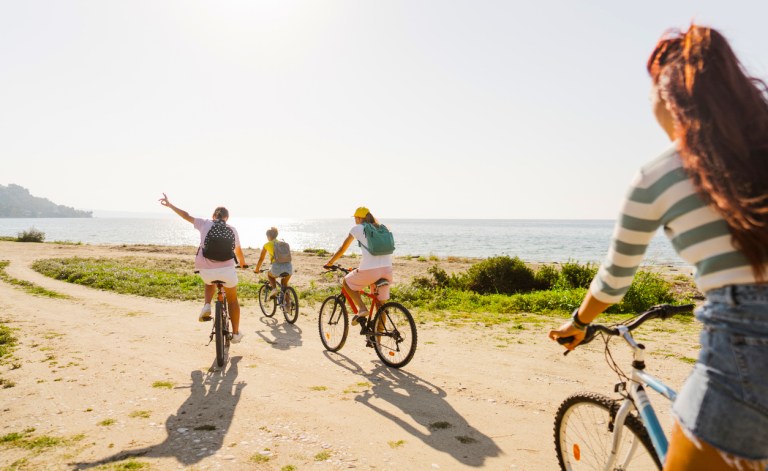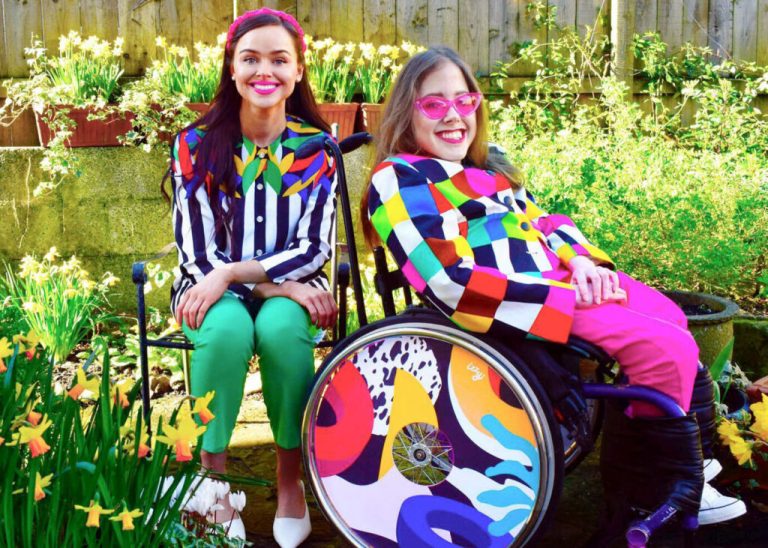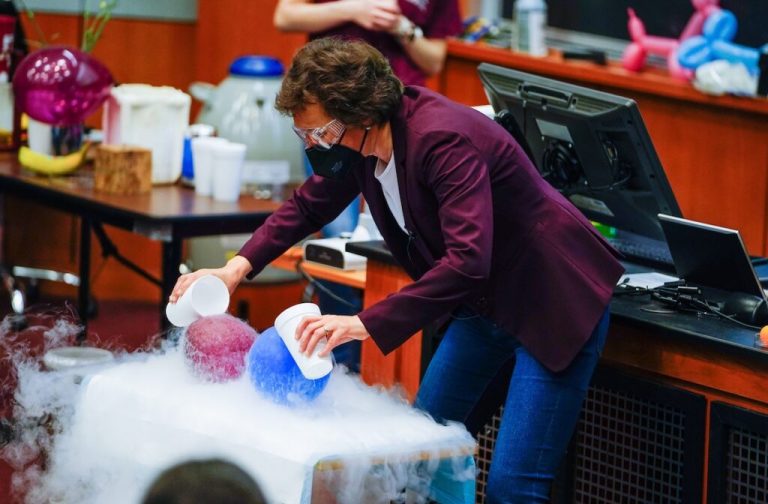In the summer of 2024, shortly after a young woman and her then-fiancé moved into a new house in Richardson, Texas, they were delighted to find that their elderly neighbor had dropped off a cake to welcome them to the community. The woman shared the sweet gesture on social media, and the video racked up over 20 million views. This past July, a follow-up post about the entire neighborhood celebrating the man’s 100th birthday with him also went viral (even the mayor attended!).
What does this anecdote demonstrate? A number of things. For one, people clearly love cake. But also, people love people — and acts of kindness and connection, even when they’re happening to those we’ve never met. The exchange illuminates something we likely all yearn for, whether consciously or unconsciously: a strong sense of community. And we can’t underestimate the power in that.
@kellyann2339 I love it here
♬ Little Things – Adrián Berenguer
The Power of Neighbors
“Research tells us that knowing even a few neighbors can lower loneliness and improve well-being,” Kelly-Ann Allen, an educational and developmental psychologist at Melbourne’s Monash University and author of The Psychology of Belonging, told Nice News in an email. “For many people, neighbors are their most important source of social connection, with many older adults having more frequent contact with neighbors than their own family.”
Allen has written extensively on the topic, and she created a Know Your Neighbors challenge (which you can download for free). “Social connection and a sense of belonging to a community or neighborhood helps with feelings of safety and alleviates isolation,” she explained. “This has important implications for mental health. Even light neighborly contact is beneficial (providing it is positive!).”
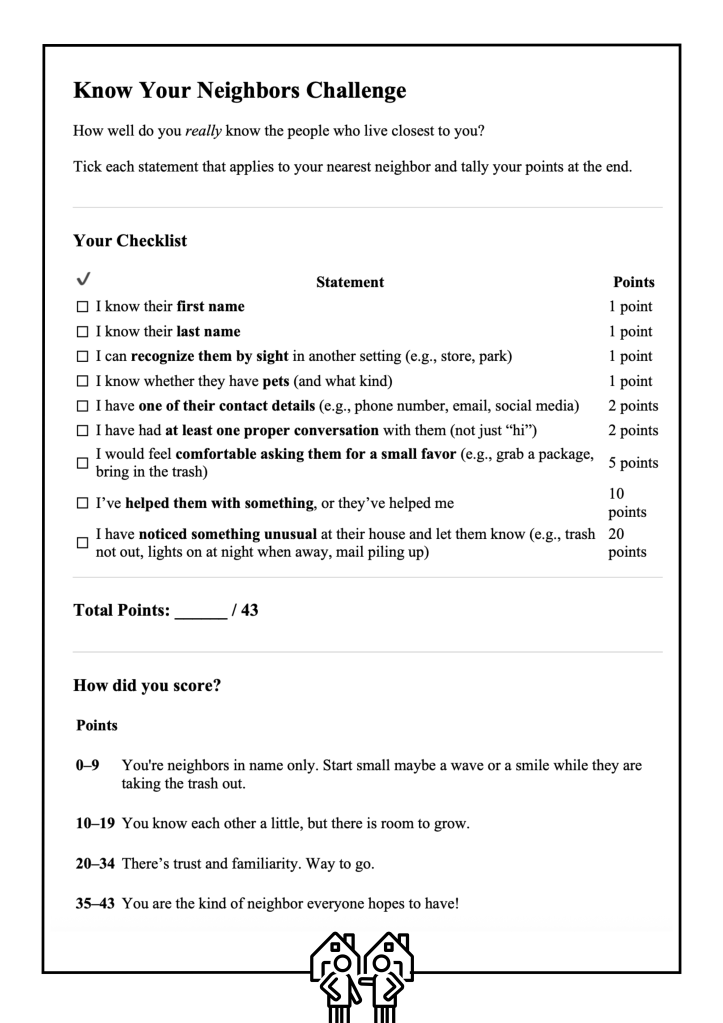
But according to a 2025 Pew Research poll, only about a quarter of U.S. adults know all or even most of their neighbors. Keep reading for expert advice on getting to know yours — and becoming a better one yourself.
How to Be a Better Neighbor
Communicate to Build Trust
Communicating with your neighbors isn’t exactly the same thing as the next entry in this list of tips, socializing (we’ll get to that), but instead refers to helpful information being shared freely and thoughtfully. As the village of Skokie, Illinois, pointed out, solid communication between neighbors builds trust.
Did you recently see or learn something your neighbor might want to know about, but figured they’d find out on their own eventually? Go knock on their door and tell them, whether it’s an upcoming block party or trash schedule change. And if you’ve never formally met before, your name is the perfect info to start with.
You could also consider volunteering your phone number to fellow community members and asking them to let you know if they ever need anything. By doing so, you’re showing that you’re someone they can turn to and entrusting them with your personal deets. Bam: trust built. Now you can both feel safer and more supported.
Socialize
We told you a while back about the big importance of small talk, and this is a great example. You might be an introvert with no desire to even make eye contact with another human while you’re trudging down your driveway to pick up the newspaper (do people still do that?), but socializing with your neighbors can go a long way in establishing a sense of community. And making small talk is less about what you say and more about the fact that you’re saying it at all.
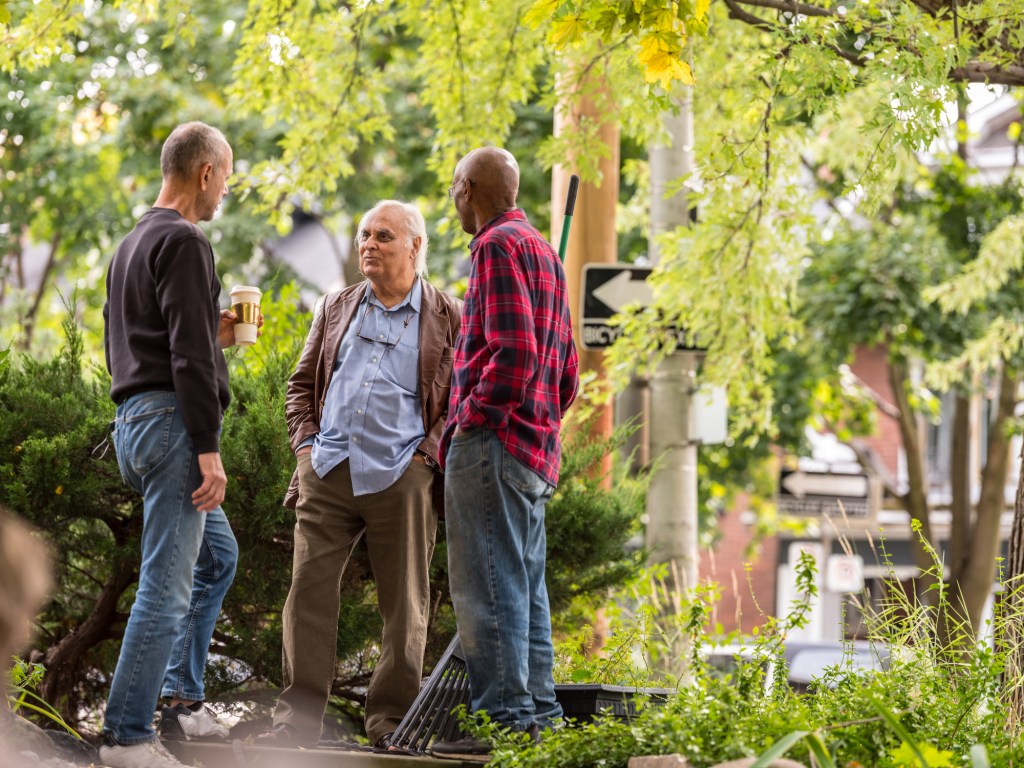
But you don’t have to leave the talk tiny — you could become actual pals with your neighbors! Doing so may enable you to not only feel comfortable turning to them for help but also have built-in buddies to chat with while you walk the dog or tend to the garden. Start socializing by offering a smile and a wave a few times at first, and then introduce yourself, ask a simple question, and let the conversation flow from there. Here’s a great resource for starting conversations with neighbors.
Be Mindful (In Other Words: Pay Attention)
Things to consider if you want to be a better neighbor: Is your trash can always overflowing? Do your kids always run across the house next door’s front lawn to get to the bus? Does your dog like to pee on a neighbor’s lawn instead of the patch of grass near the sidewalk, but because you’re on your phone during walks, you don’t often notice before it’s too late?
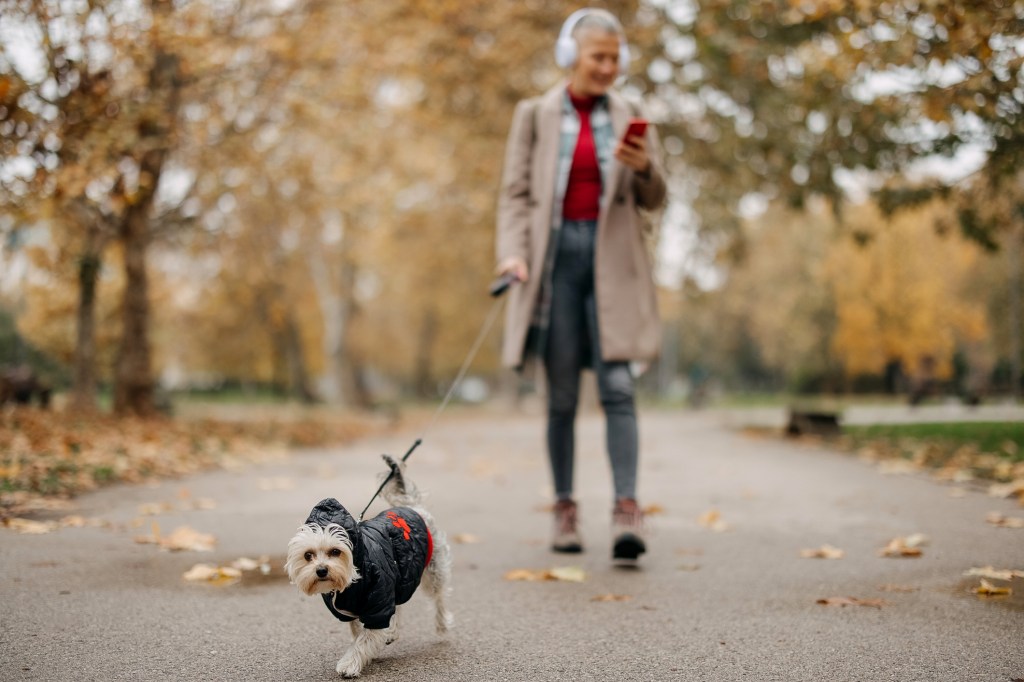
Being mindful of your behavior and property is critical to being a good streetmate. You can smile your heart out at every passerby, but if the backdrop you’re smiling in front of (i.e., your dwelling) is an eyesore, you may not get as many joyful waves in return. Keep your grass tidy. Don’t leave trash in bags outside the front door. Sweep or wash your walkway. And if you like to have your windows open, make sure what’s inside is tidy. (I once shared a wall with a neighbor who kept an empty plastic water bottle and a wrinkled dress hanging in their front window for over a year. Not lovely to look at, and it didn’t exactly encourage camaraderie!)
“Activate” Your Front Lawn
If you want to be visible in your community in the figurative sense, you’ve got to be visible in your community in the literal sense, too. Writing for the nonprofit media organization Strong Towns, Sarah Kobos recommended that people “activate” their lawns to increase their presence and approachability.
“There’s no reason why the back yard should have all the fun. Spread the love. Get out the sidewalk chalk, throw Frisbee, start a neighborhood corn hole competition, or spread out blankets and have a picnic on the front yard lawn,” Kobos suggested. “The more time you spend in the public-facing spaces, the more opportunities you have to meet your neighbors and be aware of what’s going on around you.”
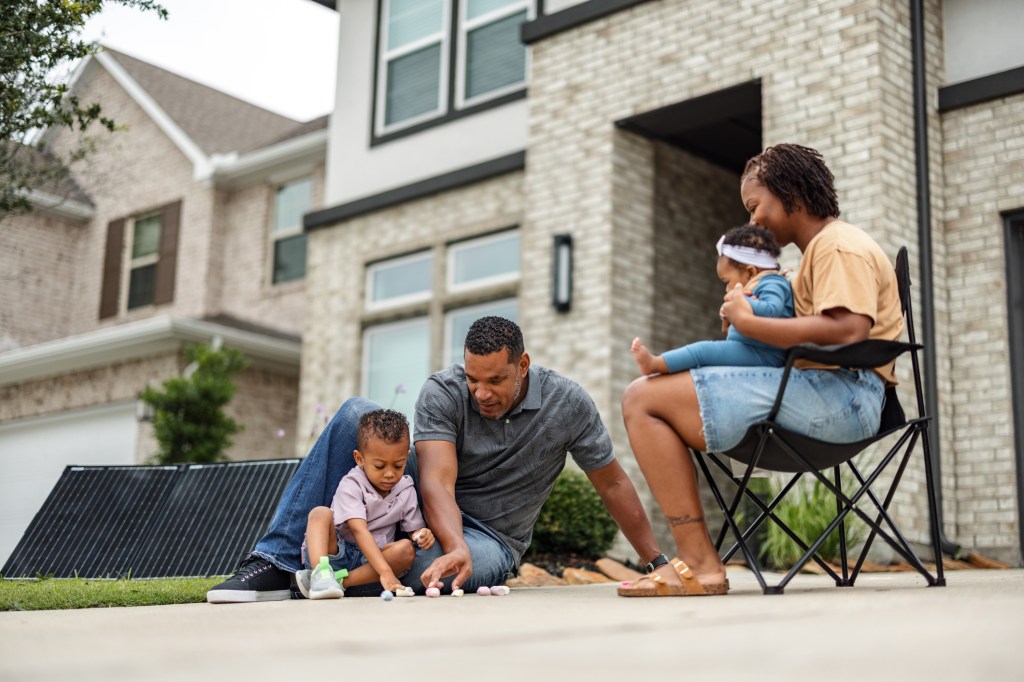
Reading a book in your bedroom? Read it on your front stoop instead. If there’s a grocery store within walking distance but you usually drive, lace up those sneaks. Better yet, adopt a regular walking routine, and you’ll notice that you pass the same people every day — say hi!
Don’t Underestimate Your Impact
Many of us have the tendency to underestimate our own power, especially when it comes to making larger changes in our communities. But one could argue that the only thing really separating those who effect change from those who don’t is that the first group takes action.
Anti-oppression consultant Sandhya Rani Jha saw this firsthand while working on their book Transforming Communities: How People Like You Are Healing Their Neighborhoods.
“The things we’re often taught are the qualities of changemakers weren’t necessarily part of what made them effective,” Jha told Nice News. “Instead, they saw something wrong, they believed something could be done about it, and they got together with other people who also believed a different reality was possible. And sometimes a big part of that was also building each other up.”
So go to that HOA meeting. Start a neighborhood group chat. Put a petition together to stop the city from cutting down the street’s biggest tree. Just get involved — and offer your support for neighbors who are doing the same.
Finally, Embrace Neighboring as a Verb
In an episode of Headspace’s short film series Neighboring, artist Maceo Paisley explains that “neighboring” should be a continuous action you take in your life. “Neighboring is something you do,” he says emphatically. “Something you continuously work at.”
Taking into account research that demonstrates how influential our language choices can be on our feelings and actions, it stands to reason that thinking of neighboring as something you do could go a long way in helping you to actually do it. Ask yourself: Have you neighbored much today?
In our estimation, neighboring means being there for others, both actively and passively. Offer small favors like walking an elderly neighbor’s dog or bringing their groceries in. Share your tools or roll someone’s trash back to the curb. Pick up litter or dog waste that was left by someone else. Make simple DIY gifts and drop them off during the holidays. Be present and be engaged.
To wrap it all up, here’s Allen’s advice on the best ways to be a better neighbor: “Say hello, offer help, and pay attention to what’s happening around you,” she said. “Aim to know at least a handful of neighbors by name, and know that even small actions can be extremely powerful in making others feel more connected and supported.”
RELATED: Intergenerational Friendships Can Enrich Your Life: Expert Tips to Broaden Your Social Circle
When you buy books through our links, Nice News may earn a commission, which helps keep our content free.


